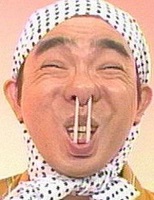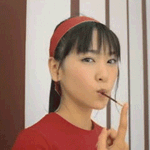deep and profound" racism in Japan, and ghost
Particularly shocking to some in the West, was a lack of sensitivity among the Japanese toward racism against black people. For example, one Japanese doo-wop pop group (see Rats & Star) in 1970s routinely appeared on stage painting their skin dark brown and wearing sunglasses to look black, totally oblivious to the implications of such an act in the West.
Similarly, during the 1980s, Takara Co. created and sold a doll called "Dakko-chan" (snuggle baby), an inflatable dark-colored plastic doll with fat lips and arms that could wrap around human arms or other pole-like objects. The doll was a commercial hit and was soon exported outside Japan as "Little Black Sambo".
Many Americans made claims that it resembled blackface costumes worn by performers in the minstrel shows popular in the past. After receiving numerous complaints, the sales of the doll were stopped. In Japan, as a sort of hasty reaction, there were efforts to remove anything that people believed were racist against black people. The sale of Japanese translations of the book "Little Black Sambo" was halted. Any pictorial representations of blacks with fat lips, especially in manga and anime, were purged during this period only.
Foreigners in Japan, particularly those from Europe, North America, Australia and New Zealand, are often called Gaikokujin or Gaijin. The first noticeable influx of foreigners occurred in the 1980s, when the Japanese government adopted a policy to give scholarships to large numbers of foreign students to study at Japanese universities. In addition, as the Japanese economy grew quickly in the 1980s, a sizeable number of Westerners began coming to Japan. Many found jobs as English conversation teachers, but others were employed in various professional fields such as finance and business.
Although some have become permanent residents or even naturalized citizens, they are generally perceived as short-term visitors and treated as outsiders to Japanese society. For some, it is hard to find the Japanese myth of "them and us" because of Japanese hospitality.
Article 14 of the Constitution of Japan states that all citizens are equal under the law, and they cannot be discriminated against politically, economically, or socially on the basis of race, belief, sex, or social or other background. However, this clause does not apply to discrimination committed by private individuals or establishments.
Hate speech is not a criminal offense, but insulting, such as calling someone "fool!", is a minor civil offense resulting in monetary compensation (which is often lower than the cost of going through the judicial process). Japan does not have human rights legislation which enforces or penalises discriminatory activities committed by citizens, businesses, or non-governmental organisations.
Japan does not have specific hate crime laws. Racism and hate-motivated offenses that include assault, vandalism, and robbery are prosecuted as regular crimes.
Attempts have been made in the Diet to enact human rights legislation. In 2002, a draft was submitted to the House of Representatives, but did not reach a vote.
Had the law passed, it would have set up a Human Rights Commission to investigate, name and shame, or financially penalise discriminatory practices as well as hate speech committed by private citizens or establishments.
Though the anti-discrimination clause raised little objection, the anti-hate speech clause received very hostile reception from Japanese media, including liberals who saw it as a potential threat to the freedom of speech and publication.
In 2005, the ruling coalition government attempted to resubmit a revised version of the draft which somewhat limited the application of hate speech clause, but it still failed to reach a consensus within the ruling Liberal Democratic Party.
Access to housing and other services
Some apartments, motels, night clubs, and public baths in Japan have put up signs stating that foreigners are not allowed, or that they must be accompanied by a Japanese person to enter.
The most common reason cited for this policy is that foreigners are associated with being overly disruptive and ignoring Japanese etiquette (which causes Japanese residents or clientele to feel uneasy and leave). This is considered to be a big social problem in Japan, however there has been no known opposition nor any legal battles against such a measure.
In the case of housing, it is often stated that those that cannot bring references from their employer or professors might be illegal immigrants who may sublet their room to a large number of other foreigners (which is undoubtedly due to a lack of housing these illegal immigrants encounter).
ref: http://en.wikipedia.org/wiki/Ethnic_issues_in_Japan
| Hot Topics | |
|---|---|
racism in Japan
17 posts
• Page 1 of 1
mercury wrote:deep and profound" racism in Japan, and ghost
ref: http://en.wikipedia.org/wiki/Ethnic_issues_in_Japan
Quite deservedly, that Wikipedia article is stamped with a big warning:
The neutrality of this article is disputed. Please see the discussion on the talk page.
That whole "article" is an opinion piece, not an encyclopedia article. Not that I disagree with all of it, but it makes sweeping generalizations without citation, uses misleading language, and is generally full of crap. Even the grammar is shit. Wikipedia should be embarrassed.
-

omae mona - Posts: 3184
- Joined: Mon Aug 18, 2003 12:08 pm
omae mona wrote:Quite deservedly, that Wikipedia article is stamped with a big warning:
You missed the glowing error in that piece!
Article 14 of the Constitution of Japan states that all citizens are equal under the law, and they cannot be discriminated against politically, economically, or socially on the basis of race, belief, sex, or social or other background. However, this clause does not apply to discrimination committed by private individuals or establishments.
That is the English version of the constitution. The Japanese version is:
Article 14 of the Constitution of Japan states that all citizens are equal under the law if they are Japanese. A Japanese cannot be discriminated against politically, economically, or socially on the basis of race, belief, sex, or social or other background. Anybody else is fair game.
Sounds about right!
"There are those that learn by reading. Then a few who learn by observation. The rest have to piss on an electric fence and find out for themselves!"- Will Rogers

-

Greji - Posts: 14357
- Joined: Fri Jun 25, 2004 3:00 pm
- Location: Yoshiwara
"Article 14 of the Constitution of Japan states that all citizens are equal under the law if they are Japanese. A Japanese cannot be discriminated against politically, economically, or socially on the basis of race, belief, sex, or social or other background. Anybody else is fair game."
yeah that's about how they run it especially for black males
I knew of one bruh who lost 2 jobs in Tokyo because of a hatin jn woman, I asked him was he pissed, he said he would "chant" about it. Aparrently those women salted his highly qualified house-us slave descendant self down to the superior others-a common occurence inside secure bldgs. Little did they know he is prime us-ok-allowed;especially for his house-us qualities, and obama physical appearance- a paradoxical mistake. Me myself am dark and short -so like miles davis once said "U know how that goes" Later I asked some jn americans would they live in japan they said fu(k no. I asked why but they gave no more answer. Ever heard of ebonics? used quite a bit in US movies.
yeah that's about how they run it especially for black males
I knew of one bruh who lost 2 jobs in Tokyo because of a hatin jn woman, I asked him was he pissed, he said he would "chant" about it. Aparrently those women salted his highly qualified house-us slave descendant self down to the superior others-a common occurence inside secure bldgs. Little did they know he is prime us-ok-allowed;especially for his house-us qualities, and obama physical appearance- a paradoxical mistake. Me myself am dark and short -so like miles davis once said "U know how that goes" Later I asked some jn americans would they live in japan they said fu(k no. I asked why but they gave no more answer. Ever heard of ebonics? used quite a bit in US movies.
- mercury
- Maezumo
- Posts: 11
- Joined: Sat May 29, 2004 5:01 pm
I'm chanting as we speak.
Aaaaany-way;
"house-us"?
"salted"? She salted him? (not his nuts?)
Little did they know he is prime us-ok-allowed;especially for his house-us qualities - WTF
The last one had me loling.
Aaaaany-way;
"house-us"?
"salted"? She salted him? (not his nuts?)
Little did they know he is prime us-ok-allowed;especially for his house-us qualities - WTF
The last one had me loling.
Mr Kobayashi: First, I experienced a sort of overpowering feeling whenever I was in the room with foreigners, not to mention a powerful body odor coming from them. I don't know whether it was a sweat from the heat or a cold sweat, but I remember I was sweating whenever they were around.
- Otaru Onsen Oral Testimony
--------------------------
Keep staring, I might do a trick.
--------------------------
Noriko you whore!
- Otaru Onsen Oral Testimony
--------------------------
Keep staring, I might do a trick.
--------------------------
Noriko you whore!
-

amdg - Maezumo
- Posts: 1880
- Joined: Mon Jun 21, 2004 9:09 pm
- Location: Leaving Noriko's bedroom window as Omae enters
What is going on here right now with all this coverage of foreign crimes.
I am right now watching The 5 pm news program on TV Asahi who has announced the next topic which is foreign shoplifters.
They also had a giant display of foreign crime saying it is increasing in the suburbs outside of Tokyo.
Looks like Blinky is working overtime.
Oh, hang on a sec....Is that it?
Blinky Ishihara is running for his third term as governor right now!:D
PS: Just called TV Asahi to complain about the mass hysteria they are trying to create directed towards foreigners.
I also told them about the Gaijin Hanzai Ura File and suggested that they are also part of this current offensive against foreigners to further fuel the flames of Nationalism and hatred towards foreigners.
I wonder which is higher the number of foreigners shoplifting or domestic shoplifters?
We all know the answer to that.
I am right now watching The 5 pm news program on TV Asahi who has announced the next topic which is foreign shoplifters.
They also had a giant display of foreign crime saying it is increasing in the suburbs outside of Tokyo.
Looks like Blinky is working overtime.
Oh, hang on a sec....Is that it?
Blinky Ishihara is running for his third term as governor right now!:D
PS: Just called TV Asahi to complain about the mass hysteria they are trying to create directed towards foreigners.
I also told them about the Gaijin Hanzai Ura File and suggested that they are also part of this current offensive against foreigners to further fuel the flames of Nationalism and hatred towards foreigners.
I wonder which is higher the number of foreigners shoplifting or domestic shoplifters?
We all know the answer to that.
-

TFG - Maezumo
- Posts: 689
- Joined: Sat Jan 13, 2007 12:42 pm
There is racism in every country.
Rascism in Japan is not something new.
It is also nowhere near the levels of rascism in the states.
We are never going to change Japan, they dont wanna change.
The only way they would ever change is if all the forigners got together and kicked up a real fucking storm.
But then, all the Japanese would remember that it was the foreigners that changed shit, and they would be right back to hating again.
Theres rascism in my own country, rascism here in japan too, if the rascism gets too much for me, I will drag my sorry ass back home.
I wonder.....If all the foreigners in Japan so on edge and repugnant at Japanese rascism levels, if you have any ideas of how to change things here.....Always complaining about the problem, never offering a solution.
1st fix rascism in our home countries, then in other countries.
Its a huge issue.
Rascism in Japan is not something new.
It is also nowhere near the levels of rascism in the states.
We are never going to change Japan, they dont wanna change.
The only way they would ever change is if all the forigners got together and kicked up a real fucking storm.
But then, all the Japanese would remember that it was the foreigners that changed shit, and they would be right back to hating again.
Theres rascism in my own country, rascism here in japan too, if the rascism gets too much for me, I will drag my sorry ass back home.
I wonder.....If all the foreigners in Japan so on edge and repugnant at Japanese rascism levels, if you have any ideas of how to change things here.....Always complaining about the problem, never offering a solution.
1st fix rascism in our home countries, then in other countries.
Its a huge issue.
Never play leapfrog with a Unicorn
-

Oradea - Maezumo
- Posts: 346
- Joined: Thu Aug 19, 2004 8:47 pm
- Location: Bottom of the bottle
oh yeah sign o times
I like that term for Ishihara-blinky...it fit him well...since jn's are so honest that's when u can tell they are lying--they start blinking their eyes...Shoko Asahara's wife would mega blink her eyes and look down when reporters questioned her.
Now I realize that racism here more than likely will never change..its the employment discrimination, housing discrimination, age discrimination for employment and the fact that no black man has ever retired from a Japanese compnay or US company over here to my knowledge.
Now I realize that racism here more than likely will never change..its the employment discrimination, housing discrimination, age discrimination for employment and the fact that no black man has ever retired from a Japanese compnay or US company over here to my knowledge.
- mercury
- Maezumo
- Posts: 11
- Joined: Sat May 29, 2004 5:01 pm
-

Takechanpoo - Posts: 4294
- Images: 4
- Joined: Fri Oct 06, 2006 10:47 pm
- Location: Tama Prefecture(多摩県)
Takechanpoo wrote:This too is dicrimination?
Your video wasn't posted right. Here it is:
http://www.youtube.com/watch?v=-19ioGniZ88
That was pretty funny but I wouldn't call it discrimination. I would call that racial stereo-type based comedy.
My wife, a Nihon-Jin, agrees, it's just a comedy skit. Sort of a "English Street Slang Instruction".
"If Nigah don't get job, then Nigah don't get BMW seven series, Nigah!". Hilarious!
Recession - When Your Neighbor Is Out Of A Job
Depression - When You Are Out Of A Job
Recovery - When Obama Is Out Of A Job
Depression - When You Are Out Of A Job
Recovery - When Obama Is Out Of A Job
-

Uhhuh35 - Posts: 623
- Joined: Sun Dec 04, 2005 1:31 pm
- Location: USA
Uhhuh35 wrote:Your video wasn't posted right. Here it is:
http://www.youtube.com/watch?v=-19ioGniZ88
That was pretty funny but I wouldn't call it discrimination. I would call that racial stereo-type based comedy.
My wife, a Nihon-Jin, agrees, it's just a comedy skit. Sort of a "English Street Slang Instruction".
"If Nigah don't get job, then Nigah don't get BMW seven series, Nigah!". Hilarious!
I'm lost!
I'm sure they are Chinese pretending to be Japanese pretending to be black...!
One is tempted to define man as a rational animal who always loses his temper when he is called upon to act in accordance with the dictates of reason. - Oscar Wilde
-

Ketou - Maezumo
- Posts: 1383
- Joined: Fri Jun 21, 2002 11:31 am
No. that is Japanese.
You cant tell the difference between chinese and japanese language yet?
You cant tell the difference between chinese and japanese language yet?
I will not abide ignorant intolerance just for the sake of getting along.
-

American Oyaji - Posts: 6540
- Images: 0
- Joined: Sun Oct 20, 2002 9:20 pm
- Location: The Evidence of Things Unseen
That clip has appeared on FG before. It's American.
This "TV pilot" is actually an American-made parody of a Japanese TV show. There are several perhaps intentional mistakes in the pilot: - The label of the green coffee bag is upside down katakana, but only says gibberish. - The news channel being shown is in Chinese, not Japanese. - The actors are badly trying to hide their North American accent. The daughter is speaking Japanese in obvious North American accent. - The crew listed in the credits all have American sounding names. They are just written in katakana.
-

Mulboyne - Posts: 18608
- Joined: Thu May 06, 2004 1:39 pm
- Location: London
American Oyaji wrote:No. that is Japanese.
You cant tell the difference between chinese and japanese language yet?
Can't you tell the difference? That IS Chinese.
Faith is believing what you know ain't so. -- Mark Twain
-

Samurai_Jerk - Maezumo
- Posts: 14387
- Joined: Mon Feb 09, 2004 7:11 am
- Location: Tokyo
I concur.Samurai_Jerk wrote:Can't you tell the difference? That IS Chinese.
"Doing engineering calculations with the imperial system is like wiping your ass with acorns, it works, but it's painful and stupid."
"Plus, it's British."
- Nameless
"Plus, it's British."
- Nameless
-

Tsuru - Posts: 2408
- Joined: Tue Jan 14, 2003 9:08 am
- Location: Farcical Blingboddery
17 posts
• Page 1 of 1
Who is online
Users browsing this forum: No registered users and 7 guests

